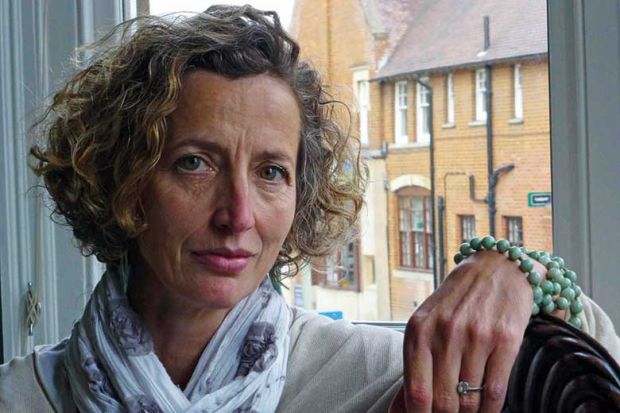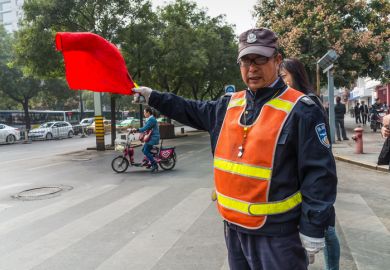Stella Bruzzi is a professor of film and television studies at the University of Warwick. Her research has encompassed costume design, documentary and the portrayal of masculinity in film, and her books include Undressing Cinema: Clothing and Identity in the Movies. She is currently director of research for film and television studies at Warwick, where she was previously head of department, and chair of the Faculty of Arts. Recently, she was appointed the new dean of arts and humanities at University College London.
Where and when were you born?
Florence, Italy, 28 January 1962.
How has this shaped you?
I will always be a proud Italian.
What were your immediate thoughts when you were offered the position of dean of arts and humanities at UCL?
First delight, then humility, then gratitude that I’d already arranged to meet a friend for a drink so the celebrations were also in place.
What will be your priorities in the role?
Spencer Tracy’s advice to aspiring young actors was to “learn your lines and don’t bump into the furniture”. After having negotiated my new staff card, found my new office and successfully logged in to my new computer, I’d set about meeting all members of my new faculty.
If you were the higher education minister for a day, what policy would you immediately introduce to the sector?
I’d wave my magic wand and say Brexit didn’t apply to the higher education sector.
If you were a prospective university student now facing £9,000+ tuition fees, would you go again or go straight into work?
I would definitely do a degree, even with fees and loans. My three years as an undergraduate, then my three years as a PhD student shaped who I am both personally and intellectually, and equipped me for life.
What kind of undergraduate were you?
A bit of a swot, but also one who got involved in a lot of student drama. I studied English and drama at the University of Manchester between 1981 and 1985. I first assumed I wanted to go into the theatre; then I thought I’d rather like to become an expert on Shakespeare and Renaissance drama. I ended up doing neither, but I have extremely fond memories of being an undergraduate.
What is the biggest misconception about your field of study?
That there’s a hard line between films that are “just entertainment” and ones that are “hard work”. They can be both at the same time.
Many academics have dedicated research to other aspects of film-making, such as cinematography, but the subject of costume in film has largely been ignored. Why?
Short answer: snobbery. It is probably due to the fact that men don’t think about clothes much – and often don’t think much of clothes – and undoubtedly because it’s viewed as a “craft” as opposed to a cinematic “art” worthy of analysis. There’s more now than there used to be, and I do like to think that my first book, Undressing Cinema, had something to do with that.
Do cinematic interpretations of political figures, such as Margaret Thatcher in The Iron Lady, have an impact on how they are perceived by the public?
I doubt politicians think at all about how they’re portrayed in the popular media – although I’m sure Tony Blair appreciated being played by Pierce Brosnan in Roman Polanski’s The Ghost! However, I do think that the public might well be influenced – if only subliminally – by fictional portrayals: whether it’s in Oliver Stone’s Nixon or Ron Howard’s Frost/Nixon, President Richard Nixon became a pitiful figure; and in The Iron Lady, Denis Thatcher is used to make Margaret seem, well, almost likeable.
If you were a costume designer working on a biopic of a recent political figure of your choice, how would you signify aspects of their character through costume?
Although she’s not strictly speaking a political figure – yet – the person I’d most like to costume is Michelle Obama…using her favourite designers: Riccardo Tisci at Givenchy, Jason Wu, Tracy Reese. I’d seek to show how the clothes don’t wear her, but rather how she wears and owns them.
What is the worst thing anyone has ever said about your academic work?
That Undressing Cinema was a coffee-table book.
What do you do on your days off?
When not feeling guilty about the work I haven’t done, I go to the cinema, the theatre, spend time with family and friends, swim and go to the gym, where I listen to the sort of music that rarely merits the swanky noise-cancelling headphones it’s being played on. Sadly predictable, I know.
What keeps you awake at night?
Either worrying about past mistakes and all the things I could have done better, or fretting over things that haven’t happened yet but could go badly: utterly counterproductive. It’s always better to get up or read a book instead.
What lessons from history are important to remember today?
Don’t assume it won’t happen again.
What achievement are you proudest of?
My children.
What film has had the single greatest impact on your life?
Max Ophüls’ Letter from an Unknown Woman. I saw that as a PhD student of drama, and the scales fell from my eyes: cinema was what I needed to study.
What advice would you give to your younger self?
Don’t worry so much about what others think of you, and don’t try to be someone you’re not.
Appointments
Jane Longmore has been appointed the new vice-chancellor of the University of Chichester. A professor of urban history, she has since 2010 been deputy vice-chancellor (academic) of Southampton Solent University. She is also director of the University Vocational Awards Council and the UK College of Business and Computing, and a fellow of the Royal Historical Society. “It has never been more vital for universities to encourage informed reflection and critical engagement with global concerns – I look forward to leading the university in addressing this crucial responsibility,” Professor Longmore said. She is due to take up the post in May 2017.
Andrew Gibson will become pro vice-chancellor of the Faculty of Science and Engineering at Manchester Metropolitan University from February 2017. A microwave scientist, he is recognised for the application of multi-physics techniques to high-power iron components, and has a particular interest in remanufacturing electrical and electronic equipment. He is currently head of the School of Mechanical, Aerospace and Civil Engineering at the University of Manchester. “It is a very exciting time for science and engineering in the city, and the university is well placed to take advantage of these opportunities,” Professor Gibson said.
Helen Watson has been named registrar and secretary of Goldsmiths, University of London. She was formerly director of planning at the University of Oxford.
The renowned classical guitarist Zoran Dukic´ will become a regular visiting guest artist at the Royal Welsh College of Music and Drama.
The House of Commons fellowship scheme has awarded fellowships to Margaret Arnott, University of the West of Scotland; Mark Bennister, Canterbury Christ Church University; Catherine Bochel, University of Lincoln; Alistair Clark, Newcastle University; and Matthew Flinders, University of Sheffield. They will work on special projects within Westminster.
后记
Print headline: HE & me




